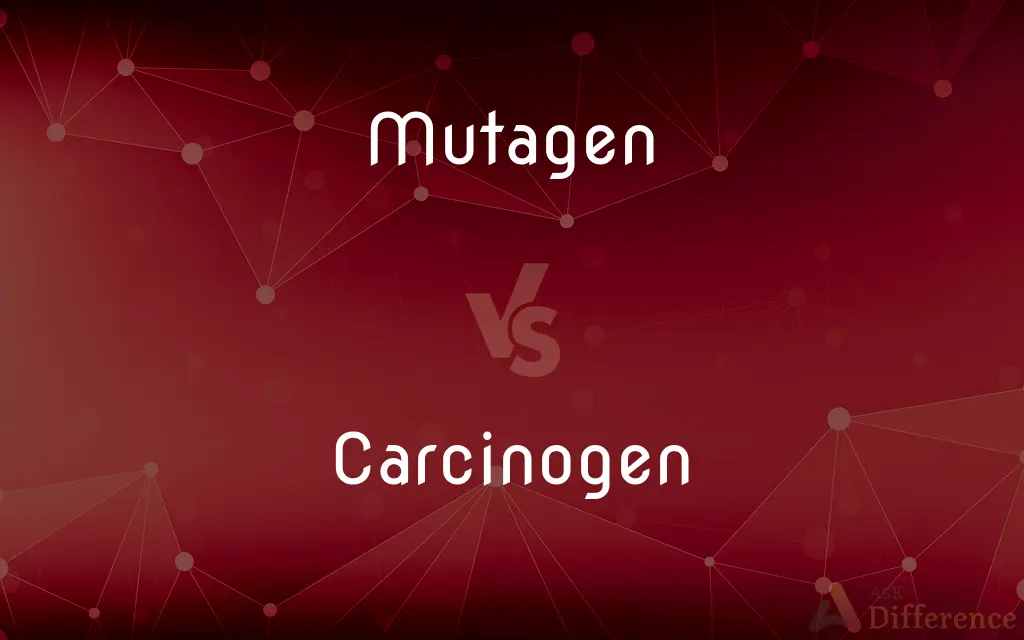Mutagen vs. Carcinogen — What's the Difference?
By Tayyaba Rehman & Fiza Rafique — Updated on March 16, 2024
Mutagens alter DNA, potentially causing mutations, whereas carcinogens specifically cause cancer, not all being mutagenic.

Difference Between Mutagen and Carcinogen
Table of Contents
ADVERTISEMENT
Key Differences
Mutagens are agents that cause changes in the DNA sequence of an organism, which can lead to mutations. These changes can be beneficial, neutral, or harmful. Whereas carcinogens are substances or exposures that increase the risk of cancer by damaging cellular mechanisms, not all carcinogens directly alter DNA sequences.
Mutagens can be physical, chemical, or biological entities that disrupt the genetic material within a cell, potentially leading to significant alterations in genetic function. On the other hand, carcinogens may lead to cancer through a variety of mechanisms, including but not limited to DNA damage. Some carcinogens may cause cancer by promoting cellular proliferation or inflammation, without directly mutating DNA.
The effects of mutagens are not always visible immediately and can accumulate over time, leading to diseases such as cancer or contributing to the evolutionary process. Whereas, the effects of carcinogens are often more specifically linked to the initiation and promotion of cancer, which can also develop over a long period of exposure.
Testing for mutagenicity and carcinogenicity involves different methodologies, reflecting their distinct impacts on biological systems. Mutagenicity tests, such as the Ames test, assess the potential of a substance to cause mutations. Carcinogenicity tests, however, evaluate the potential to cause cancer, often through long-term animal studies.
While all carcinogens have the potential to contribute to cancer development, not all mutagens are carcinogens. Some mutagens cause genetic changes that do not lead to cancer but may cause other genetic disorders or have no observable effect.
ADVERTISEMENT
Comparison Chart
Definition
Agents that cause DNA changes.
Substances that cause cancer.
Primary Effect
DNA mutation
Cancer development
Mechanism
Direct DNA interaction
Varied, not always mutagenic
Associated Risks
Genetic disorders, cancer
Primarily cancer
Example
UV radiation
Tobacco smoke
Compare with Definitions
Mutagen
Can cause diseases if mutations are harmful.
Exposure to mutagenic chemicals can increase the risk of genetic disorders
Carcinogen
A substance or exposure that increases the risk of cancer.
Asbestos exposure is known to be a powerful carcinogen, especially for lung cancer.
Mutagen
Can be physical, chemical, or biological.
X-rays are a physical mutagen that can damage DNA.
Carcinogen
Identified through epidemiological and laboratory studies.
Long-term studies have shown that smoking tobacco is carcinogenic.
Mutagen
An agent that causes genetic mutation.
Ultraviolet light can act as a mutagen, causing skin cells to mutate.
Carcinogen
The effect often develops over a long period.
Prolonged exposure to carcinogenic substances in the workplace can increase the risk of cancer later in life.
Mutagen
May lead to beneficial, neutral, or harmful genetic changes.
Some bacteria develop antibiotic resistance due to mutagenic influences.
Carcinogen
Not all directly alter DNA.
Some carcinogens promote cancer by causing cells to divide more rapidly.
Mutagen
Involved in the evolutionary process.
Mutations introduced by mutagens can contribute to species evolution.
Carcinogen
Can be classified as physical, chemical, or biological.
Hepatitis B virus is a biological carcinogen that can lead to liver cancer.
Mutagen
In genetics, a mutagen is a physical or chemical agent that permanently changes genetic material, usually DNA, in an organism and thus increases the frequency of mutations above the natural background level. As many mutations can cause cancer, such mutagens are therefore carcinogens, although not all necessarily are.
Carcinogen
A carcinogen is any substance, radionuclide, or radiation that promotes carcinogenesis, the formation of cancer. This may be due to the ability to damage the genome or to the disruption of cellular metabolic processes.
Mutagen
An agent, such as a chemical, ultraviolet light, or a radioactive element, that can induce or increase the frequency of mutation in an organism.
Carcinogen
A cancer-causing substance or agent.
Mutagen
Any agent or substance that can cause genetic mutation.
Carcinogen
A substance or agent that can cause cancer.
Mutagen
A chemical compound or other external influence (such as ionizing radiation) which causes mutations{3}.
Carcinogen
Any substance that produces cancer; as, to test for carcinogens in the drinking water.
Mutagen
Any agent (physical or environmental) that can induce a genetic mutation or can increase the rate of mutation
Carcinogen
Any substance that produces cancer
Common Curiosities
Are all mutagens carcinogens?
Not all mutagens are carcinogens, as some mutations do not lead to cancer.
What is a mutagen?
A mutagen is any agent that causes a change in the DNA sequence of an organism.
How do mutagens work?
Mutagens work by directly interacting with DNA, causing mutations that may alter genetic function.
How do carcinogens lead to cancer?
Carcinogens can lead to cancer through various mechanisms, including DNA damage, promoting abnormal cell growth, or inflammation.
How are mutagens detected?
Mutagens are detected through tests like the Ames test, which assesses the mutagenic potential of a substance.
Are there safe levels of exposure to carcinogens?
For many carcinogens, no safe level of exposure has been established, though risk may vary depending on the level and duration of exposure.
Can mutagens be beneficial?
Yes, in some cases, mutagens can lead to beneficial genetic changes that may confer advantages, such as resistance to antibiotics in bacteria.
Can a substance be both a mutagen and a carcinogen?
Yes, some substances can both cause mutations and increase the risk of cancer.
Can lifestyle choices affect exposure to carcinogens?
Yes, lifestyle choices, such as smoking or diet, can affect an individual's exposure to carcinogens.
How are carcinogens classified?
Carcinogens are classified based on their cancer-causing potential in humans and animals, often through epidemiological and laboratory studies.
What is a carcinogen?
A carcinogen is any substance or exposure that increases the risk of developing cancer.
Do all carcinogens directly damage DNA?
Not all carcinogens directly damage DNA; some promote cancer through other biological mechanisms.
Is UV radiation a mutagen, a carcinogen, or both?
UV radiation is both a mutagen and a carcinogen, as it can cause DNA damage leading to mutations and increase the risk of skin cancer.
How can exposure to carcinogens be minimized?
Exposure to carcinogens can be minimized through lifestyle choices, workplace safety measures, and adherence to public health guidelines.
Can carcinogens affect everyone the same way?
Individual susceptibility to carcinogens can vary based on genetic factors, overall health, and concurrent exposures to other substances.
Share Your Discovery

Previous Comparison
Table vs. Chart
Next Comparison
Period vs. GroupAuthor Spotlight
Written by
Tayyaba RehmanTayyaba Rehman is a distinguished writer, currently serving as a primary contributor to askdifference.com. As a researcher in semantics and etymology, Tayyaba's passion for the complexity of languages and their distinctions has found a perfect home on the platform. Tayyaba delves into the intricacies of language, distinguishing between commonly confused words and phrases, thereby providing clarity for readers worldwide.
Co-written by
Fiza RafiqueFiza Rafique is a skilled content writer at AskDifference.com, where she meticulously refines and enhances written pieces. Drawing from her vast editorial expertise, Fiza ensures clarity, accuracy, and precision in every article. Passionate about language, she continually seeks to elevate the quality of content for readers worldwide.















































